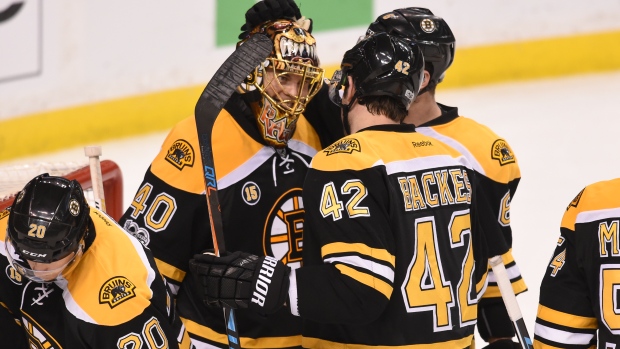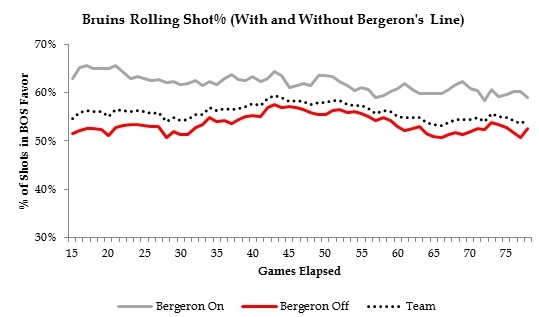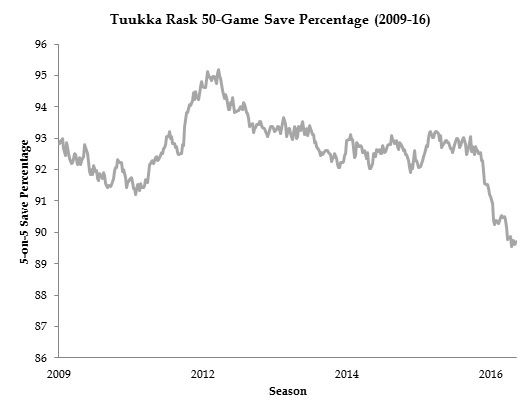Apr 6, 2017
A lower-seeded team that may surprise in NHL playoffs
One of the more popular discussions heading into the playoffs is about the chance or likelihood of a lower-seeded team making a long run.
By Travis Yost

One of the more popular discussions heading into the playoffs is about the chance or likelihood of a lower-seeded team making a long run.
It’s as hard to forecast as anything, but there are some shared themes across the teams that have managed to pull this type of run off in the modern era. They are, and in no particular order: (a) a team that’s steadily improved over the course of the season, be it due to player replacement, player acquisition, or other variables; (b) a talented goaltender who gets white-hot at the right time; and (c) a team whose supporting performance metrics – like how well they control the shot or scoring chance clock – appear superior than their true goal performance.
If you are looking for an example of this type of team, I think the 2011-12 Los Angeles Kings are something of a case study. Their goal differential put them right near the postseason cut-off line, but their supporting metrics – they were getting 58 per cent of the shots/chances in games leading up to the playoffs – signaled a team that was quite possibly more dangerous than their 52 per cent goal rate showed. Combine that with goalie Jonathan Quick turning in the best performance of his career, and you had a team that was virtually unbeatable when it mattered most.
This year has been interesting in that there are a couple of teams who I would certainly argue have the potential to pull off one or more upsets (looking at you, Nashville and Calgary). But, no team deserves the ‘X Factor’ label more than the Boston Bruins, and for a number of reasons.
As a starting point, the Bruins have dominated the shot clock all year long. This was true under Claude Julien and it remains true under Bruce Cassidy. In fact, the only thing that’s really changed during the coaching swap is that the Bruins have started to benefit from the percentages – Cassidy’s Bruins have shot 8.9 per cent (fifth in the NHL) and have stopped 92.6 per cent of shots (16th in the NHL). Both are marked improvements.
If the Bruins have been anything this season, it’s consistently stable – and impressive – on the shot clock. The Bergeron line has absolutely decimated everyone and I think there’s a reasonable argument to be made they have been the best trio across the entire NHL. The depth, though, has also pulled their weight.

The key takeaway to me is that there hasn’t been a single stretch this season in which the Bergeron line, the non-Bergeron lines, and the team in general have been out-shot at 5-on-5. Is this the type of team you want to play heading into the playoffs? Probably not.
But as the Bruins more than anyone know, just winning the shot clock sometimes isn’t enough. You need another driver. Sometimes that driver is a great power-play. Sometimes it’s an elite shooting team. And sometimes it’s goaltending. Boston had none of the above for a long stretch of this season, which is the exact reason why their shot advantage was only enough to keep them afloat, rather than make them a serious competitor for the division.
On that point: the interesting dynamic with the Bruins is that they have a goaltender who is, in one word, proven. In fact, the most perplexing part of this season wasn’t that the Bruins back-up goaltending had been so shoddy, but that starter Tuukka Rask had been painfully average. And maybe that’s being kind.
The thing about Rask though is that he has an impressive track record of quality performance. While I don’t bet on regression for the sake of betting on regression, I throw you this graph and ask what is likely more real: his puck-stopping talent suddenly diving towards back-up talent, or a weird and inexplicable downtick that’s headed (or already heading) for normalization.

Outside of that downtick in 2010-11, Rask has been an incredibly reliable goaltender. He’s been arguably one of the league’s three best, in the mix with the likes of Henrik Lundqvist and Carey Price. In light of that, and the fact that he’s 30-years old and seems reasonably healthy, I find it truly hard to believe that he suddenly went from ‘great NHL puck-stopper’ to ‘barely can play in the NHL.’
Maybe Rask isn’t the guy he once was. Maybe the mileage his body has racked up is starting to take its toll. But the question I would ask you: what’s his true talent? If he’s not a 92.5 per cent guy, is he a 92.0 per cent guy? Is it 91.5 per cent? Keep in mind any – and I mean any – of those categories would be a significant upgrade over what he’s been in the 2016-17 season.
And that’s fundamental to the Bruins question. Even if you believe Rask has seen his best days, surely you would bet that he’s better than he’s shown of late. And if he’s just an OK goalie, then you need to ask yourself: how dangerous is an elite 5-on-5 team with an OK goaltender? What about if that goaltender is a little better than OK?
It’s what makes the Bruins so dangerous. If I’m a top-seed in the East, and I’m looking at teams like Ottawa, Toronto, or New York, I’m quite aware of both their strengths and weaknesses. If I’m looking at the Bruins, I know their strengths and weaknesses too.
But are their weaknesses real? I’m less sure. And that’s not the best feeling for a top-seeded team to have.

